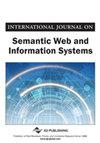基于邻接模糊谓词推理的知识图语义增强知识发现方法
IF 4.1
4区 计算机科学
Q2 COMPUTER SCIENCE, ARTIFICIAL INTELLIGENCE
International Journal on Semantic Web and Information Systems
Pub Date : 2023-06-01
DOI:10.4018/ijswis.323921
引用次数: 0
摘要
从知识图谱中海量结构化数据中发现深层语义并给出合理解释是人工智能的一系列重要基础研究问题。然而,知识图谱中隐藏在实体之间的深层语义却无法得到很好的表达。此外,由于许多谓词表达了模糊关系,现有的推理方法无法有效地处理这些模糊语义并解释相应的推理过程。针对上述问题,本文引入模糊理论,提出了一种新的可解释推理模式。该方法侧重于分析知识图中相关实体之间的模糊语义。通过标注邻接谓词的模糊语义特征,设计了一种新的语义推理模型,实现了知识图上的模糊语义扩展。基于可视化和查询实验的评价表明,该方案优于初始知识图,可以发现更多有效的语义信息。本文章由计算机程序翻译,如有差异,请以英文原文为准。
A Semantically Enhanced Knowledge Discovery Method for Knowledge Graph Based on Adjacency Fuzzy Predicates Reasoning
Discover the deep semantics from the massively structured data in knowledge graph and provide reasonable explanations are a series of important foundational research issues of artificial intelligence. However, the deep semantics hidden between entities in knowledge graph cannot be well expressed. Moreover, considering many predicates express fuzzy relationships, the existing reasoning methods cannot effectively deal with these fuzzy semantics and interpret the corresponding reasoning process. To counter the above problems, in this article, a new interpretable reasoning schema is proposed by introducing fuzzy theory. The presented method focuses on analyzing the fuzzy semantic between related entities in a knowledge graph. By annotating the fuzzy semantic features of adjacency predicates, a novel semantic reasoning model is designed to realize the fuzzy semantic extension over knowledge graph. The evaluation, based on both visualization and query experiments, shows that this proposal has advantages over the initial knowledge graph and can discover more valid semantic information.
求助全文
通过发布文献求助,成功后即可免费获取论文全文。
去求助
来源期刊
CiteScore
6.20
自引率
12.50%
发文量
51
审稿时长
20 months
期刊介绍:
The International Journal on Semantic Web and Information Systems (IJSWIS) promotes a knowledge transfer channel where academics, practitioners, and researchers can discuss, analyze, criticize, synthesize, communicate, elaborate, and simplify the more-than-promising technology of the semantic Web in the context of information systems. The journal aims to establish value-adding knowledge transfer and personal development channels in three distinctive areas: academia, industry, and government.

 求助内容:
求助内容: 应助结果提醒方式:
应助结果提醒方式:


